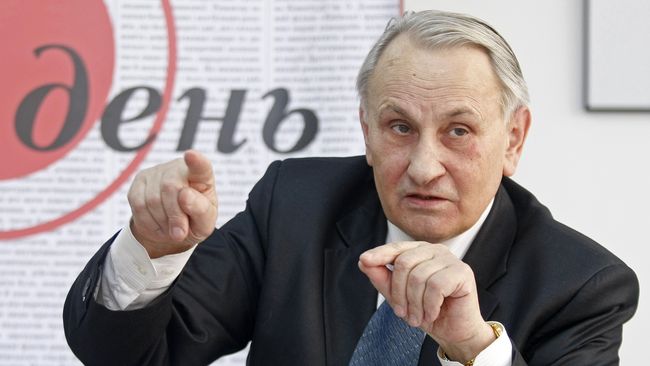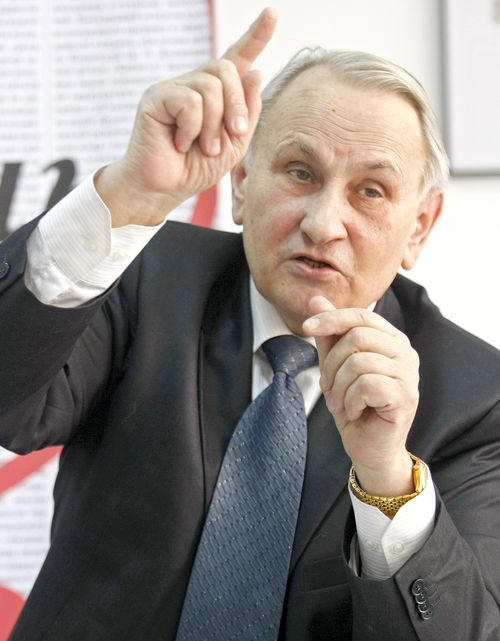Inaction is disastrous
Academician Yaroslav YATSKIV: “Countries that can put new knowledge to effective use can have real independence and security in this world”
The following is The Day’s Ihor SIUNDIUKOV’s interview with Dr. Yaroslav YATSKIV, veteran manager of the Ukrainian National Academy’s Observatory, member of the Academy’s Presidium, astronomer and astrophysicist known well beyond Ukraine’s borders, a personality with a clear-cut civic stand, Chairman of the Ukrainian National Committee on Science and Culture, and a public figure who has traveled round the world, visiting Ukrainian ethnic communities in Canada, US, Brazil, Australia, UK, Germany, Austria... Dr. Yaroslav Yatskiv is an old friend of, and contributor to, Den/The Day. He carefully reads every issue. He is a member of the 1st December Initiative Group. His scholarly interests reach further than the stars. Astronomy is his lifelong occupation and he reiterates that any bold, effective scientific allegation must be proved by facts, for this is the rule in the hard sciences. Dr. Yatskiv also takes an interest in Ukrainian history and humanities.
He gratefully accepted Editor-in-Chief Larysa Ivshyna’s present, another Library Series book The Crown, or Heritage of the Rus’ Kingdom. He said he would be very interested to read the book, that its subject was very topical, and that he would certainly write a feature on it: “I will, but only after I read this large work numbering 700 pages.”
After that I could interview the noted scholar. We spoke not about current events, but about Ukraine’s future. He relied on his long life experience and called a spade a spade, while weighing every word he said…
WE MUST REMEMBER HRYHORII SKOVORODA WHO SAID “KNOW THYSELF”
Dr. Yatskiv, considering that you have dedicated decades to science, may I ask you what role do you think science is playing in the life of our society and how this role is being understood by our ruling political class? History offers facts that show that epoch-making scientific and technological discoveries have often changed the course of humankind and refuted all forecasts. Suffice it to say the invention of book printing in Europe, in the 15th century, the steam engine in the 18th century, steamships instead of sailing ships in the early 19th century (Napoleon Bonaparte failed to understand their advantage in his campaign against Britain and was severely punished for this by history), nuclear weapons (when President F.D. Roosevelt commented on Albert Einstein’s letter warning against the usage of energy produced by the splitting of uranium atom: ‘This requires action.’) and, finally, the current fantastic progress of nano- and biotechnologies. Do you think that our decision-makers in Ukraine realize that degrading science leads nowhere?
“A very good question. As a natural scientist, I call a spade a spade. No Ukrainian administration in the 26 years of our national independence has realized the importance of science and innovations. There have been statements made and decrees signed to this effect, but no practical steps have been taken. Criticizing those ‘upstairs’ is in vogue here and I could be willingly among those critics, but I always note the pluses and minuses of each administration. Captious criticism can’t lead to progress. I believe that social stability and unity are rooted in diversity, in finding the right footpath, making progress, and very importantly, in the initiatives produced by the scientific, spiritual, and other elites.

“One ought to remember Hryhorii Skovoroda who said: ‘Know thyself,’ and I’m the first one to vouch for that. If our elite, the creative part of our society could do this and determine which way to go and what to achieve, we’d all be living a better life. Ukraine would be a more stable, even prospering country. Before this interview, I put together dozens of files relating to scientific and social progress. Back in the 1990s, 2000s, and in recent years I submitted copies to various authorities. Result? I’m ashamed to comment on this. In 1998, I forwarded a letter to those ‘upstairs,’ stressing that countries that can put new knowledge to effective use can have real independence and security in this world. No response. I also wrote that Ukraine’s national interests require the most effective usage of its scientific potential and innovations. I wrote this 20 years back. Yes, I used cliches, but someone had to do something…”
THE TROUBLE WITH ADMINISTRATION: WORDS AND NO DEEDS
Why such an attitude? No response?
“The trouble with our administration is that there are only words, no deeds. We have scientists and they keep working on their projects, among them a highland observatory (this is especially important to me). All such projects start with an idea, followed by a combined effort that produces an actual result. This is most important, but something those ‘upstairs’ fail to realize. This is the only way to show that one has made an achievement.
“There has been progress, of course. When I worked for the Ministry of Education and Science [of Ukraine], I signed science park drafts. Each such project was good, it combined science, production, and technology. The idea was conceived by Academician Volodymyr Semynozhenko. I was in charge of such science parks in 2000-01. I’m formally still in charge of such projects as a member of the Presidium of the National Academy of Sciences. At the time, the administration canceled all such projects, saying they had ‘certain shortcomings.’ Stupid! Those science parks provided for a great investment influx. They could give the state far more than they would receive in terms of advantages (duty-free equipment).
“There is still no legislation on science parks. Our Prime Minister has learned to say the right words, yet there is no bill on innovations. We hear a lot statements, we have rampant bureaucracy, but little is being actually done. For years we have been waiting for the bill on the higher school to be passed, along with countless other bills relating to education and science.”
STEP DOWN, YOU’RE TOO LATE
“Our bloated bureaucratic machine doesn’t meet the needs of this civilization. Here you’re forced to step down because you’re too late. That’s the rule of the game. You step down and may find yourself finally noncompetitive (God forbid). Suppose we analyze our mistakes (I’m not trying to avoid my responsibility for any of them). In my letter dating back to 1998, I wrote: ‘Science will die without government and public support; without science this state will have no future.’ Hasn’t the experience of the past 20 years proved me right? Degradation is increasing. Many agree that this is really so, but, again, words and no deeds. I’m horrified to realize that public confidence in science is fading. I sensed this when meeting with colleagues at the Kyiv City Teacher’s House.”
This leads to intellectual paralysis that will inevitably destroy our future, won’t it?
“Horrible but true. When sipping my morning coffee, I listen and read astrologers’ forecasts. What kind of intellect does this take? It’s as though we weren’t living in the 21st century.”
There is another interesting subject. Quasi-sciences, shows like Psychic Challenge, mystics, and so on.
“I wouldn’t want to discuss any of this. We’re talking science and its status, aren’t we? If a state seeks international prestige – or is at least trying to play a major role in civilizational evolution – it must help develop science. There are countries where supporting science is a pragmatic matter. They want to improve the quality of their products and their competitiveness. We have to choose between becoming a great scientific power and following in the footsteps of the Academy of Sciences under the Soviets, when it was in the lead of applied rather than fundamental sciences. Our inaction is disastrous.”
UKRAINE’S FIRST PRESIDENT MADE A BAD MISTAKE SUBSTITUTING DECOMMUNIZATION WITH DEINDUSTRIALIZATION
What other [Soviet/post-Soviet] heritage is an obstacle on this road?
“I think that Ukraine’s first president made a bad mistake substituting decommunization (something that was vitally important) with deindustrialization. This shouldn’t be done and we’re suffering from the consequences. At the time, it was believed that free market would resolve all problems (an attitude criticized by Den/The Day). This didn’t work and will never work, I’m sure. This is a recipe/remedy for many countries, but not for Ukraine. For us, the result was more than lamentable, with the rich getting richer and the poor getting poorer. Let’s face it. What has happened to Ukraine is that 60 percent of its residents are below the poverty line, according to UN estimates. Can one be a conscientious citizen if one can’t survive? The 1st December Initiative Group (I’m its member) came up with a statement referring to Archbishop Lubomyr Husar who admonished that man/society should be allowed to grow/evolve in freedom. We’d discussed the statement for a long time, considering whether we were opposing our society, rather than the current administration. We believe that this stand is very important. Compared to Russia as the aggressor state, Ukraine has an advantage: it has the germs of freedom and the rudiments of civil society. All this must be jealously protected, for this is our only hope. We scholars must do our best to convince everyone that a country turned into a source of raw materials, reduced to an agrarian status, without added value, can have no future in the modern ruthlessly competitive world. Here is something else. I recently took part in a prestigious European symposium dedicated to astronomy (I paid for my trip, but that was OK for I wanted Ukraine’s voice to be heard). I was the only representative of Ukraine while Russia sent seven delegates. You think it’s a trifle? Although it is true that Russia’s science is noticeably being degraded, the fact remains.”
There is another acute problem: a massive exodus of talented youth from Ukraine. These young people don’t want to – or can’t find – adequate jobs here, so they travel to the West and to China. Expert estimates point to this as a mounting threat to Ukraine’s national security. What do you think?
“I think that this could turn out to be the worst threat to our national security. Our National Committee on Science and Culture (which I’m honored to chair) carried out an analysis of our ‘itinerant laborers’ since 2000. It shows the changes that are taking place.”
SCIENTISTS SEEK EMPLOYMENT ABROAD BECAUSE THEY HAVE NO PROSPECTS IN UKRAINE
“This exodus is explained not by low pay, but because our [young] scientists have no prospects in Ukraine. Most of them believe they won’t have any in the long run. The National Committee submitted a number of recommendations, referring to China. There young scientists are given tangible government (sic) subsidies for a term of five years and allowed to study abroad (mainly in the West). The only condition is that each must return home after five years. They do, otherwise they must repay the subsidy. The Chinese observe the rules. We have seen them in practically every country, in every major university and laboratory.
“Our scientists have learned from this experience. Dozens of noted members of the National Academy of Sciences and other prestigious high schools fly to China and stay there for quite some time, working for universities and businesses – but on one condition: their papers with Chinese logos must appear in English in the world’s major journals. This has become standard practice. However, this means losing intellectual, scholarly priority [for Ukraine], considering that the intellectual resource is far more important than the energy, military or financial one in the modern world. This is also a threat to national security.”
(To be continued)
Newspaper output №:
№70, (2017)Section
Topic of the Day





